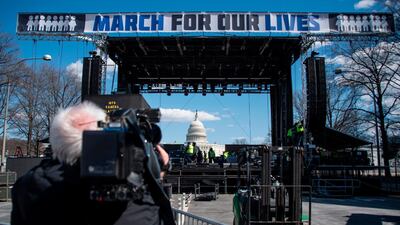Bundled against the cold but fired up with passion after the Florida high school massacre, crowds gathered in Washington on Saturday for what is expected to be the biggest US gun control protest in a generation, with hundreds of thousands attending.
The student-organised protest is to feature rallies from coast to coast, with the main event in Washington within sight of the US Capitol - whose lawmakers the protesters hope to influence.
"Let our votes be our best weaponry," said one of the many signs carried by early protesters, who arrived more than three hours before the event's official mid-day start.
Thousands of demonstrators poured out of the city's subway and had already filled Constitution Avenue and Pennsylvania Avenue, which links the White House with the Capitol, making it difficult to get close to the main stage.
The area was closed to traffic in order to hold the half-million protesters squeezing into streets flanked by giant video screens proclaiming their slogan, "March for Our Lives."
Lauren Tilley, 17, said she arrived from the other side of the country in El Dorado County, California, with seven other teens and three adults.
"We came here through an essay contest. They raised the money in order for usto fly here for the march," Ms Tilley said, holding a sign calling for the US Constitution's Second Amendment, the right to bear arms, to itself be amended.
"We are the people who are scared to go to school every day because we don't know if we are next," she said.
"Our main message is we are not going to be quiet, we will keep fighting. I don't care how much money you have, your money can't drown out the sounds of our voices. We will be voting in 2020. Our generation wants change."
Other marchers carried homemade signs reading: "My dress code is stricter than our gun laws," "Your right to bear arms doesn't override my right to stay alive," and "Your silence leads to violence."
A large peace sign decorated with flowers called for a ban on assault rifles, such as the type used in the Florida shooting.
"The Second Amendment doesn't guarantee, I don't believe, the right to own an assault rifle," said Billy McLaughlin, 67, a teacher from West Virginia.
He and other demonstrators repeated a common complaint of gun control advocates, that politicians are beholden to the powerful National Rifle Association lobby group.
"We shouldn't have guns in our society. These kids are right," said Jeff Turchin, 68, of New York. "They're basically saying the NRA is paying off these Republicans," the party of President Donald Trump, which controls the Senate and House of Representatives.
Students from Marjory Stoneman Douglas High School in Parkland, Florida - where 17 people were shot dead on February 14 by a 19-year-old former classmate - have been the driving force behind the march.
They have been relentlessly badgering US lawmakers to enact a ban on assault rifles and to expand background checks to cover all gun purchases, even private sales.
"The march is just the start," said Aalayah Eastmond, a 17-year-old junior who took shelter beneath the body of a classmate during the Stoneman Douglas shooting.
"Columbine happened - nothing's changed. Sandy Hook happened - nothing's changed. Parkland happened - nothing's changed," Ms Eastmond said.
"We will fight for this until change happens," she said at an event with members of US Congress.
________________
Read more:
Florida lawmakers pass bill to restrict gun sales
Hugs, tears and police: Florida high school reopens after shooting
________________
Since the Parkland shooting, the state of Florida and the US Congress have made only modest tweaks to gun laws and Mr Trump's proposal to arm teachers has been met with widespread resistance.
Organisers say more than 800 marches are being held across the country and around the world under the slogan #NeverAgain, with the Washington event alone anticipated to attract at least 500,000 people.
The protests are expected to be the largest for gun control in the United States - which has more than 30,000 gun-related deaths a year - since the Million Mom March in May 2000.
The appeals for stricter gun regulations have drawn the backing of Democratic lawmakers, and a slew of American celebrities have pledged $500,000 donations to support the protests.
They include actor George Clooney and his wife, Amal, a human rights lawyer; actress and media mogul Oprah Winfrey and director Steven Spielberg and his actress wife, Kate Capshaw.
Performing at the rally in Washington are Lin-Manuel Miranda, Ben Platt, Ariana Grande, Jennifer Hudson, Miley Cyrus, Demi Lovato, Common, Andra Day and Vic Mensa.
The marchers have also attracted the support of former president Barack Obama, who tried but was blocked by Congress in an attempt to reform gun laws following the Sandy Hook slaughter.
Mr Obama and his wife, Michelle, released a letter to the "Students of Parkland" praising their "resilience, resolve and solidarity" and saying they have helped "awaken the conscience of the nation."
According to a Quinnipiac University poll, 63 per cent of American voters approve of the march in support of tougher gun laws but are not optimistic it will lead to new legislation.

